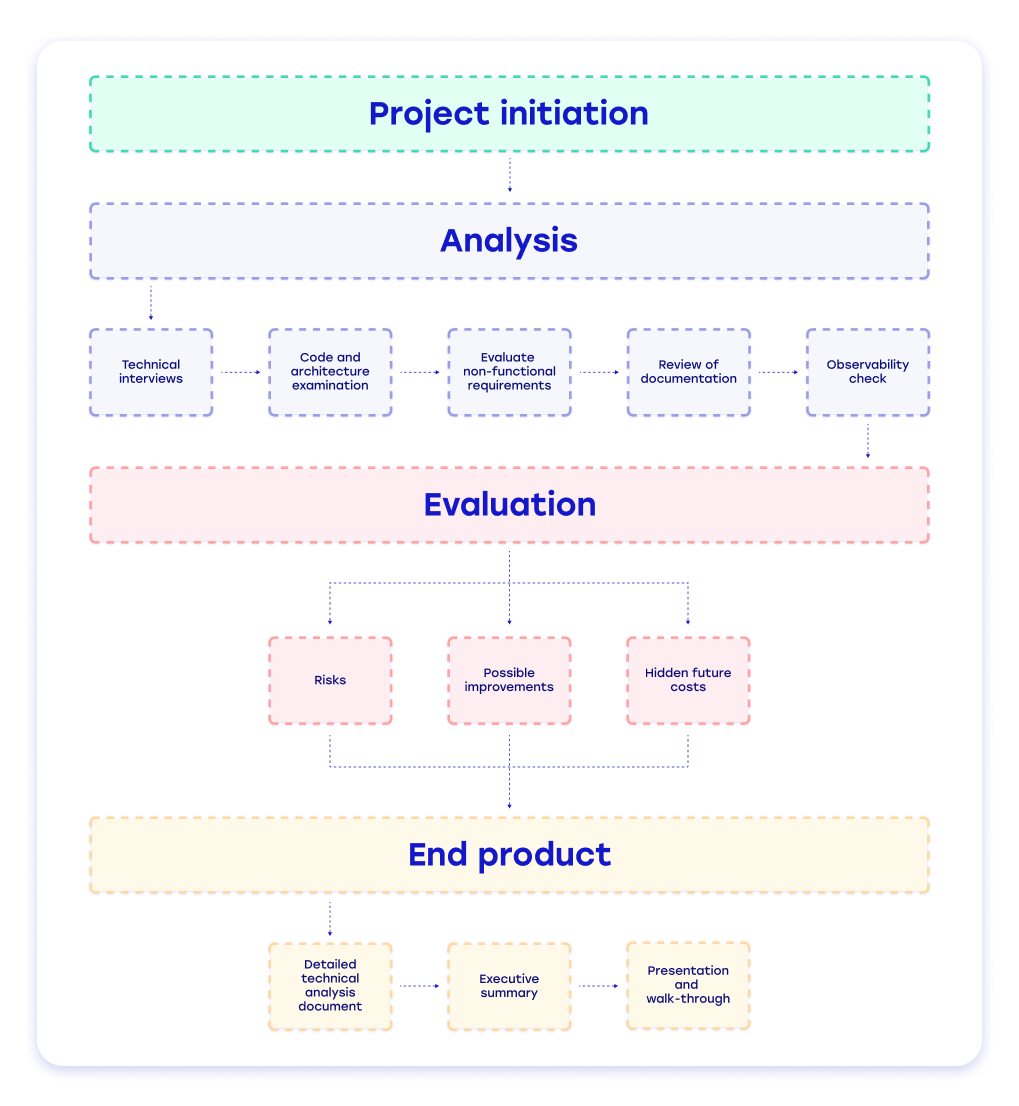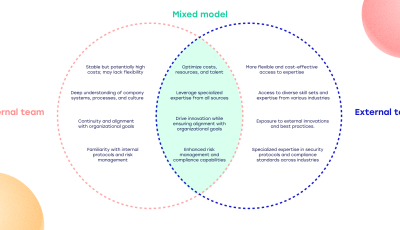When purchasing technology or custom-developed software, hidden costs, technical debt, and long-term maintenance challenges can significantly diminish your investment. By conducting professional software due diligence, you can make better investment decisions and potentially save millions by uncovering the true condition of the system before finalizing a deal. Helmes specializes in providing a comprehensive, fast, and impartial assessment to ensure you have the complete picture.
What is Software Due Diligence?
Software due diligence is the process of thoroughly examining a software system landscape before investing in a technology company or its offered solution. This involves identifying hidden risks, assessing technical debt, and estimating future maintenance costs. By conducting this process, you have an accurate estimate of the true value of the investment.
Why Do It?
Software due diligence not only helps identify potential risks but can also uncover whether you’re being misled about the actual maintenance costs. Every software application has technical debt, and we’ll provide you with a clear understanding of its extent. Our analysis offers real numbers and insights that empower you to make informed decisions, avoid unnecessary expenses, and strengthen your negotiating position.
Helmes Software Due Diligence Process
At Helmes, we provide a business-focused, detailed software due diligence process. You will gain an understanding not only of the software’s current state but also of the hidden costs and risks that could affect your acquisition.
We prioritize the system’s business needs alongside technical metrics. By identifying the most critical parts of the software, we ensure that our evaluations align with your business goals. For example, when evaluating a Point of Sale (POS) system, we focus on the integrity of the order and payment processing logic. In the case of medical systems, the protection of sensitive data takes precedence. For applications used by thousands of users, delivering a seamless user experience is essential.

Project initiation
We establish direct communication with the current system owners to lay the groundwork for an effective due diligence process. Together, we agree on the project’s process and participants and sign necessary NDAs and other needed contracts. We also organize access to the codebase, servers, and related infrastructure.
Technical Interviews
We conduct interviews with the product manager, developers, and operations staff to gain insights into the software’s history, development process, and any known issues. These discussions often reveal critical information, such as discrepancies between the timelines set by the business and actual technical feasibility, as well as the presence of deprecated libraries that may require costly updates in the near future.
In-Depth Code and Architecture Examination
Our technical team conducts a comprehensive review of the code and infrastructure. We assess the system’s architecture and code quality using industry-standard tools such as SonarQube or PMD. Additionally, we evaluate the maturity of key processes such as development, code review, release management, and maintenance. We also identify outdated technology and components, as these can significantly increase future maintenance costs or even risk the software becoming obsolete. For example, think of a mobile app that may be removed from the Play Store if it isn’t updated.
Identification of hidden future costs
Our due diligence process reveals hidden future costs associated with software systems. We assist clients in identifying significant annual expenses related to third-party tools integrated into these systems. By evaluating the simplicity of the system’s architecture, the health of the code, and the levels of automation, we deliver a realistic forecast of future maintenance costs. Whether the issues involve outdated technology or insufficient automation in deployment, we make sure you know the actual expenses of keeping the software operational.
Evaluating Non-Functional Requirements
We assess critical non-functional requirements such as auditability, high availability, extensibility, scalability, and performance. This process clarifies the system’s ability to handle growth, compliance, and operational demands, ensuring it fulfills your long-term business objectives.
Documentation and Knowledge Transfer Assessment
We assess existing documentation to ensure it is current and comprehensive. Without proper documentation, future developers may face significant costs in reverse-engineering the system. In some cases, we’ve encountered incomplete or outdated documentation that hampered knowledge transfer and increased maintenance difficulties. Our evaluation ensures that your future team will have the information they need to succeed.
Observability and Monitoring Systems Check
For large systems, observability is crucial to ongoing success. We evaluate the effectiveness of monitoring tools like Datadog to ensure that the system is fully observable and easy to maintain. Additionally, we also analyze historical logs to assess the system’s maturity and identify potential problem areas.
Presenting the Results: Clear, Actionable Insights
At the end of our software due diligence process, we provide a comprehensive, easy-to-understand report that includes both detailed technical findings and a high-level executive summary. This format ensures that stakeholders at all levels – from technical teams to executives – can clearly comprehend the insights and implications.
The report will highlight any risks, hidden costs, and areas for potential improvement, giving you a clear picture of the system’s strengths and weaknesses. If needed, we also offer a formal presentation to guide you through the results, allowing for interactive discussions and clarifications. This approach ensures you not only understand the current state of the software but also have actionable insights to inform your decision-making and negotiations.
I like Helmes’ holistic and professional approach to the work
Endrus Arge, CEO of Silen
Why Partner with Us?
Partnering with Helmes ensures that your software due diligence process is thorough, efficient, and aligned with your business goals.
- Accurate Financial Insights: You may be unaware of the actual maintenance costs. We’ll provide you with accurate figures so you can plan accurately.
- Business-Focused Approach: We recognize that software is a valuable business asset. Our due diligence process is designed to align with your strategic objectives, maximizing the benefits you get out of your acquisition.
- Technical Expertise: With our extensive knowledge and the use of industry-leading tools, we offer a comprehensive assessment of the software’s health and long-term viability.
- Enhanced Negotiation Leverage: By identifying hidden issues, we help you negotiate better terms and avoid overpaying for software that may require costly fixes.
Let’s talk. Contact us today.
Get in touch




